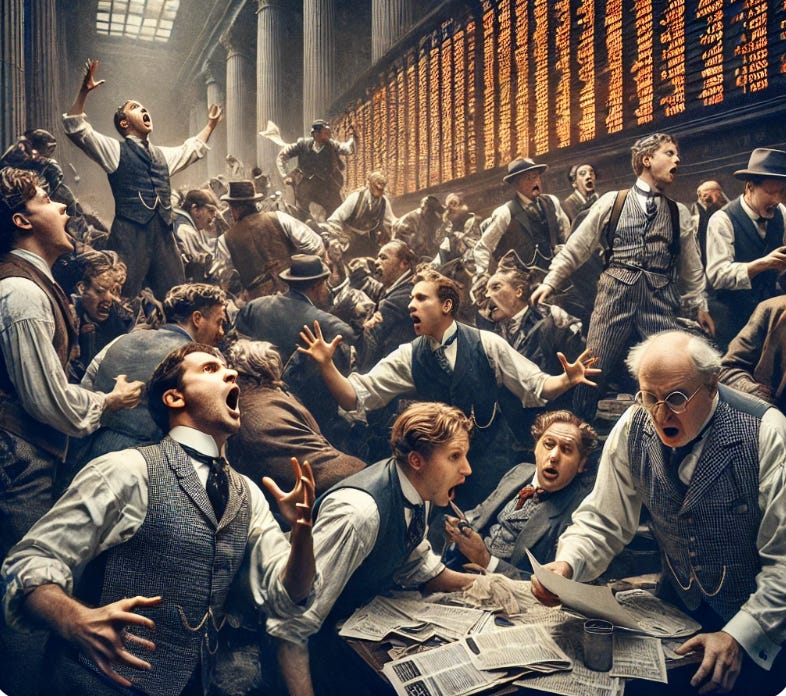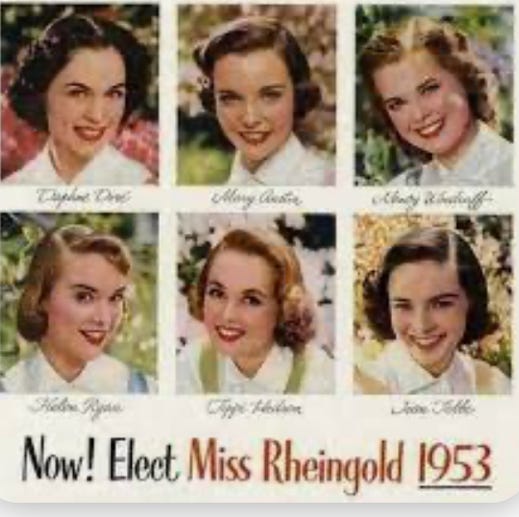What If Deciding To Get Married Was Like Deciding To Buy A Stock
Plus John Maynard Keynes and my unfashionable, fearful investing style.
I suppose that when some people get married they cross their fingers or more subtly their toes as they say “I do” and vow “until death do us part.” They tell themselves that if and when the marriage no longer suits them, they always have the option of divorce, albeit with some friction costs. Indeed, some marriages are annulled after days or weeks. I know this because I recently watched the movie Anora.1
These people would approach marriage banking on the freedom conferred by marital liquidity. They might be pleased with their marriage for the rest of their lives but they enter marriage with an ease of spirit, knowing that they can always “get out” either to change spouses immediately or sit on the sidelines waiting for a more attractive option.
Those of us who invest in the stock market do so in much the same way. We buy a stock or an index and hope we’ve chosen wisely, ideally until “’til death do us part.” We hope we possess the emotional fortitude to ride out inevitable crises of confidence, i.e., not panic when things get a little rocky.
But we also take great comfort (false comfort as I’ll argue) that we can sell our investment any time we change our mind about it. Perhaps there’s an issue with the underlying company and it fails to meet our performance expectations (“Now that we’re married, I see what a slob he can be and as a husband he’s become a selfish, thus terrible, lover”)
Or it could be a so-called “macro” issue. The company’s performance is fine but we feel that the overall investing environment has changed for the worse. (“If being married means I can’t take my dream job as a Balinese dancer in Jakarta, this marriage must end.”)
Of course the comparison between a marriage and a stock fails because when dissolving a marriage it’s not necessary, as it is for a stock, to find a “buyer” for your spouse. Although it would be a fascinating change to divorce laws if the spouse initiating divorce was required to find replacements for both herself and her spouse before the divorce could be finalized. In that way, like the total number of shares of a stock, the total number of married people, absent death and new marriages, would stay static.
John Maynard Keynes, the great economist and bon-vivant member of the Bloomsbury group of the 1920s and 1930s, also had ideas about stocks and marriage. He had a satirical solution to the speculative investment bubbles that led to the Great Depression of the 1930s.
“…make the purchase of an investment permanent and indissoluble, like marriage, except by reason of death or other grave cause…” 2
In his personal life, Keynes was a “player.” As a younger man, he had a number of love affairs with other men in the Bloomsbury set and then married a famous Russian ballerina. He really did say his only life regret was in not drinking more champagne. 3
Keynes is best known for his economic theories but he was also an avid speculator in currencies and a buyer of stocks. Like most speculators who borrow “on margin” to finance risky trades, he experienced bouts of investing disaster. He came out fine in the end, but I’m quite sure his observations about investing were informed by his own investing experiences.
Below are a few of his more famous observations. Where it fits I’ve connected them to my own investing misadventures or how they might be relevant to marriage.
Keynes: The Liquidity Illusion
As individual investors we take comfort that we can sell if we change our minds. But here’s the illusion. Consider the entirety of the investment community. For every seller there must be a buyer. Someone has to own the stock we no longer care for. That’s one reason we have such great volatility even when nothing seems to have changed. Fear of missing out creates bubbles as many individuals rush to buy. Fear of being the greater fool, the loser in a game of musical chairs, creates crashes as many individuals rush to sell.
I have been afraid of being the greater fool. But perhaps I’ve been the greater fool by worrying that I could become one.
Marriages are of course not really “liquid.” While a modern divorce is far easier to obtain than it was in Keynes’ time, the divorces I’m familiar with have taken a great toll.
Keynes on looking only where there’s light
When making investment decisions we give great weight to the immediate past and immediate future because that’s what we can be reasonably confident about. In reality it’s what will happen many years out, the longer term, that will determine the success of an investment but we can’t have rational confidence in predicting the longer term. Far too much uncertainty.
It’s like looking for your lost keys at night under a streetlamp because that’s the only part of the street you can see.
The same is true of a marriage. We know what our spouse is like today but we can’t be certain what they will be like in the distant future.
Keynes’ newspaper beauty contest
When we’re investing for the short term we’re implicitly trying to predict the valuation assessment of other investors rather than our own. Because it’s the opinions of others that will determine what happens to the investment in the short term.
Here Keyes uses his famous analogy of a newspaper beauty contest where the object is not to select our view of the most beautiful face but instead to predict which face will be selected as the most beautiful by the most people. You can think about it as being wise about the wisdom or the folly of crowds.
In my investing I have a natural tendency to be attracted to what other investors consider to be ugly. So no crypto or AI darlings or large tech stocks for me.
I don’t have FOMO (fear of missing out), I have ROMO, the reality of missing out.
The connection of the newspaper beauty contest to marriage is tenuous, unless we delve into mimetic theory, i.e., that we choose our spouse principally because they are desired by others.
Keynes: Smells like animal spirits
For most of economic history, there was little separation between the ownership and day to day management of a business. The factory owner ran the factory, the farmer farmed the farm. With modern markets, we invest with an outsider’s point of view, knowing very little about a company’s inner workings and without any control over the company’s destiny.
So when we buy a stock we need a dose of what Keynes called “animal spirits,” for how else can we have the boldness to stare into the long, dark future of an investment and declare “I am not afraid. “
The same boldness is needed to commit to a marriage. As much as I was in love with my then future wife, I was still terrified to say the words “Will you marry me?”
In terms of our current investing environment, I am fearful not bold. I am burdened by the history of having lived through the crashes of 2000 and 2008 where stocks lost half their value. So my animal spirit is currently a possum playing dead (the investment equivalent is to have lots of cash). I see predators everywhere in the markets and I don’t want them to maul my savings. 4
I’m also 62 years old and losing half my wealth would cause far more pain than the pleasure of increasing it.
A word on investment advice
My contrarian, “glass half empty” outlook has not served me well these past few years. I’ve missed all the booms that are still booming: crypto, AI companies, large cap blue chips.
But before continuing to self-flagellate, I want to say that generalized investment advice makes no sense because it needs to fit someone’s specific life circumstances. There’s a vast difference between helpful advice for someone in their thirties who wants to start saving for retirement and someone who is seventy, already retired, and spending down their savings.
The thirtysomething may be well served by investing a consistent amount in an index fund representing most of the entire stock market. And they should be happy if there’s a crash because that will enable them to buy at cheaper valuations. Their goal is to have as much as possible in forty years’ time, regardless of interim fluctuations.
The retiree, on the other hand, may look at the stock market and consider that a massive decline could ruin their retirement while a massive increase would be nice but its marginal utility to their lifestyle would be negligible. Their risk/reward is skewed very differently.
My unfashionable investing style
My investment criteria are that I generally want current income, I want to understand (or believe I understand) what I own, and I want what I own to have a valuation that seems reasonable to me by historical standards. As an investor, that makes me totally out of fashion.
Keynes wrote that in investing it is better for one’s reputation to fail conventionally than to succeed unconventionally. Since my only client is myself (and my wife), I’m not worried about my investment performance damaging my reputation.
According to my wife, my reputation would suffer far more damage if I went out in public wearing knee-high block socks and shorts.
Question for the comments: Open season as usual, but also disregard my advice and give us your favorite investment. It can be anything you think will provide a good return, whether a stock or something to consume.
I recommend this movie.
That Swiftian quote and the investing observations come from Keynes’ seminal 1936 book, The General Theory of Employment, Interest and Money.
https://quoteinvestigator.com/2013/07/11/more-champagne/
I exaggerate for effect, I am mostly invested in assets other than cash but in a wide variety of assets, primarily private with some public equities. I’ve tried to reduce my risk through diversification. Although if markets generally turn ugly I may find out that a good part of my risk reduction through diversification was illusory.








I’ve always thought of marriage more like M&A
Just here to comment on the AI-generated fingers crossed in the first image. I can't unsee it now lol